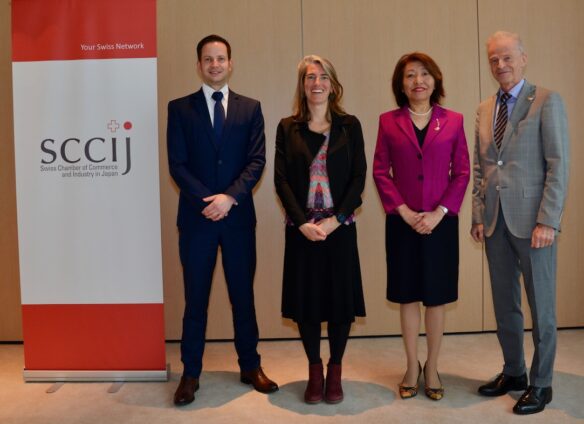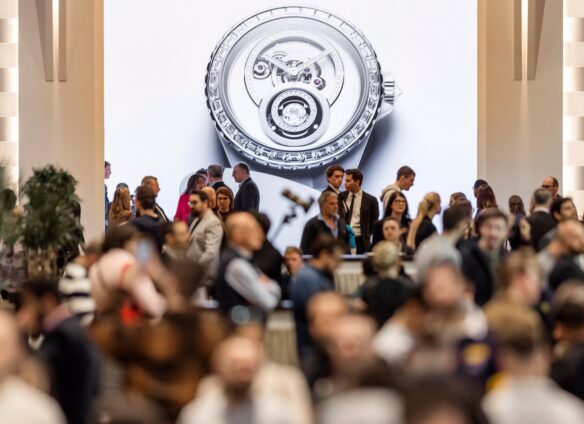Tokyo (SCCIJ) – Empowering older mothers and housewives could be a solution to closing the gender gap as well as mitigating the scarcity of labor in Japan. This was the core message of Ms. Cynthia Usui, leader of Coca-Cola Japan Tokyo 2020 Olympic Games hospitality team, at the December Luncheon of the Swiss Chamber of Commerce and Industry in Japan. A former housewife herself, she restarted her second career at the age of 52 with a part-time hourly job. Her bestseller “Eight Things Full-Time Housewives Should Do Before Entering the Workforce” has recently been turned into an eight-episode drama broadcast on NHK. More than 40 members and guests of the SCCIJ came to listen to this powerful luncheon speaker.
“Where are the supermen?”
Ms. Usui started her talk about working women with the surprising question, “Where’s Superman?”. Her answer was clear: “I could not have succeeded with my late career without a Superman. In fact, not without several Supermen! One thing I’ve learnt is that women can’t close the gender gap on their own. Men also have an important role in supporting women in the workplace,” she said. The message behind her statement was also clear: If women want to succeed in the workplace, they need male supporters because of the huge gender gap. “Somebody has to make a commitment to somebody like me for the gender gap to grow smaller,” she stated. “We have enough company programs and summits where the topic is talked to death but we need more male leaders who will take a leap of faith on women and their potential,” she added.
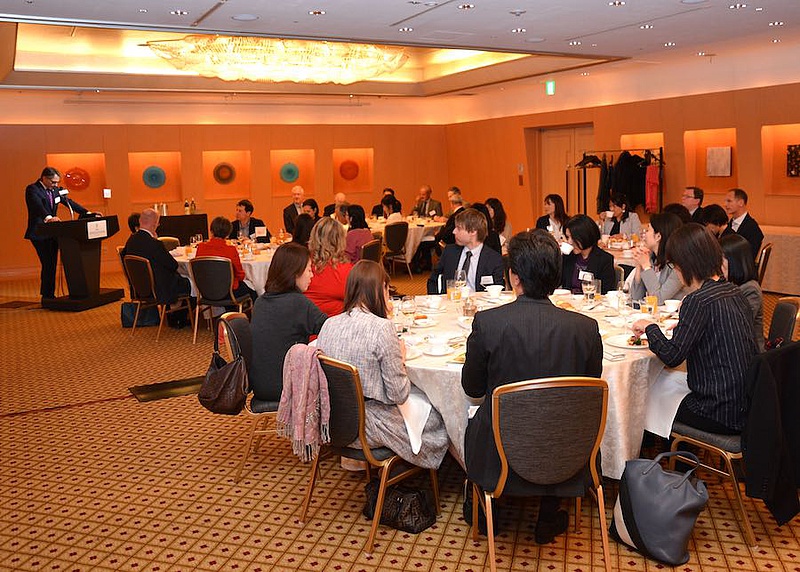
SCCIJ December Luncheon
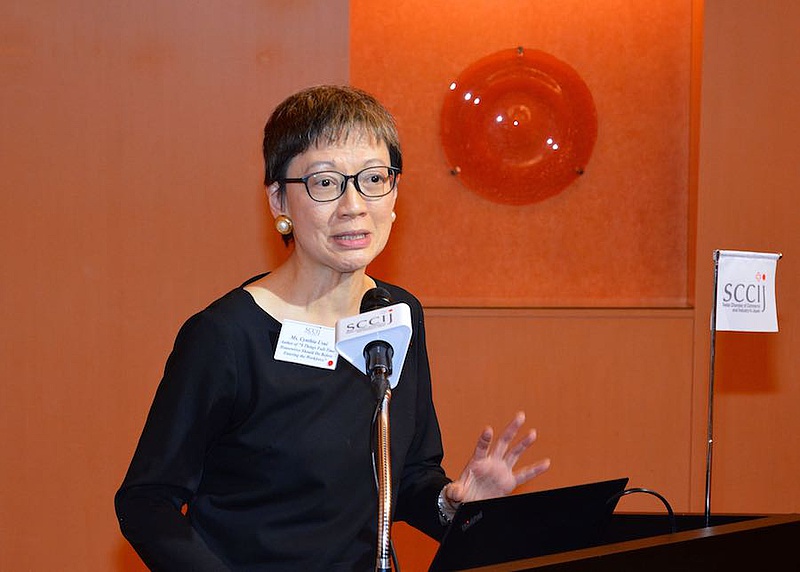
SCCIJ December Luncheon Speaker Ms. Cynthia Usui
Equal opportunities since 32 years
In 1986, Japan enacted the “Equal Employment Opportunity Law”. Three decades later, Japan’s overall female employment rate had climbed to 66.1% – surpassing that of the United States. But, despite so many working women, Japan has actually slipped in the World Economic Forum’s (WEF) gender equality rankings, falling from 80th in 2006 to 114th in 2017. Ms. Usui had an explanation: “The challenge today is not that we don’t have enough women in the workplace, but that women still don’t have the same opportunities as men.”
Her approach sounded new to the audience: In addition to building child care facilities to encourage young mothers to return to work, older mothers and women should be motivated to rejoin the workforce and build careers. “There are 12 million women who came of age before the Equal Employment Opportunity Law was enacted, and they are ready to work,” the luncheon speaker said.
Mental barriers need to be overcome
But those housewives and mothers with grown-up children would need a different kind of support to make them come back to professional life. “They need to have confidence, they need a little push, because they are full of angst,” she argued. This would be very difficult to understand for somebody who has not been in that position. “First, they suffer from low self-esteem because they do not get objective feedback for their work as mums and wives,” she said.
“Second, there is the pride factor because many of these women want to rejoin the workforce on the same level at which they were when they left it,” she added. As a result, they will not take an entry-level job because they cannot accept being less than what they were earlier. For example, some women with a good university education would refuse to work in a uniform and start with an hourly pay of 1,000 yen. Thus, these women would need to accept that the world has changed, that technology has changed and that they have to adjust first before their second career can take off.
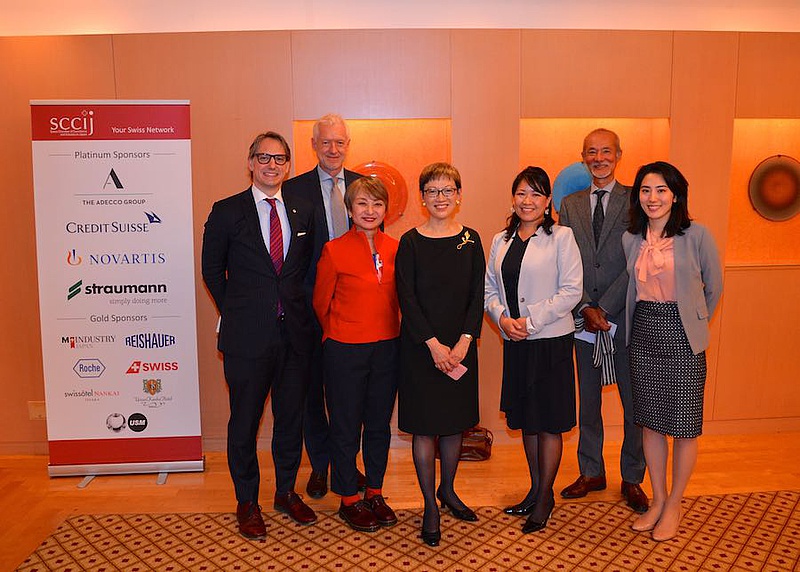
Luncheon speaker Ms. Usui with members and advisors of the SCCIJ Executive Commitee and guests
METI support for comeback of shufu
After realizing these barriers, Ms. Usui started a “comeback shufu (= housewife)” project with the help of a grant from the Ministry of Economy, Trade and Industry (METI). She called it the “learning and unlearning course”. “Such women do need to learn some skills but at the same time need to change their mindset,” she emphasized. Even if they are convinced to start at a lower level, they lack self-esteem. “Then, I list the tasks they are supposed to do and ask them one by one whether they think they can do this or not,” she said. Very often, this would be enough to convince them to give it a try.
Three months on this first job would be necessary to develop the right attitude towards their new professional life. After learning this, Ms. Usui is offering career counseling for women of her shufu course who have taken up a first job. But the luncheon speaker admitted another difficulty. “It is not easy to reach out to these women because they are so far away from the professional world and do not use social media,” she said. Hence, only seven women participated in her course, while three places remained empty.
At the end of her speech, she made a final appeal to the audience: “Please hire a woman with a gap in her resume, offer her support and provide opportunities for career development!”. “I am not asking you to treat housewives differently but at least interview them,” she added. She also had an advice for such women: “Once you get the chance, it is up to you because in this fast changing environment you do not need twenty years to build a career.” She was granted a big applause.
Biography of the speaker
Ms. Cynthia Usui is a multilingual and multicultural professional who has lived, studied and worked in Southeast Asia, North America, Europe and Africa. She arrived in Japan in 1980 as a Japanese government scholar, and is a graduate of the Tokyo University of Foreign Studies. She began a career in advertising, and in 1989, decided to stay home to raise a daughter.
She went back to work in 2011 as a part-timer, and in 2013, was recruited as a Corporate Sales Manager at ANA InterContinental Tokyo where after three years she was promoted to Assistant Director of New Business Development.
Ms. Usui has published “専業主婦が就職するまでにやっておくべき8つのこと” (“Eight Things Full-Time Housewives Should Do Before Entering the Workforce”), a book outlining the steps women can take to rejoin the workforce, and NHK has recently broadcast “主婦カツ!”, an eight-episode drama based on her book. Ms. Usui now leads the Coca-Cola Japan Tokyo 2020 Olympic Games hospitality team.
Text and photos: Martin Fritz for SCCIJ





